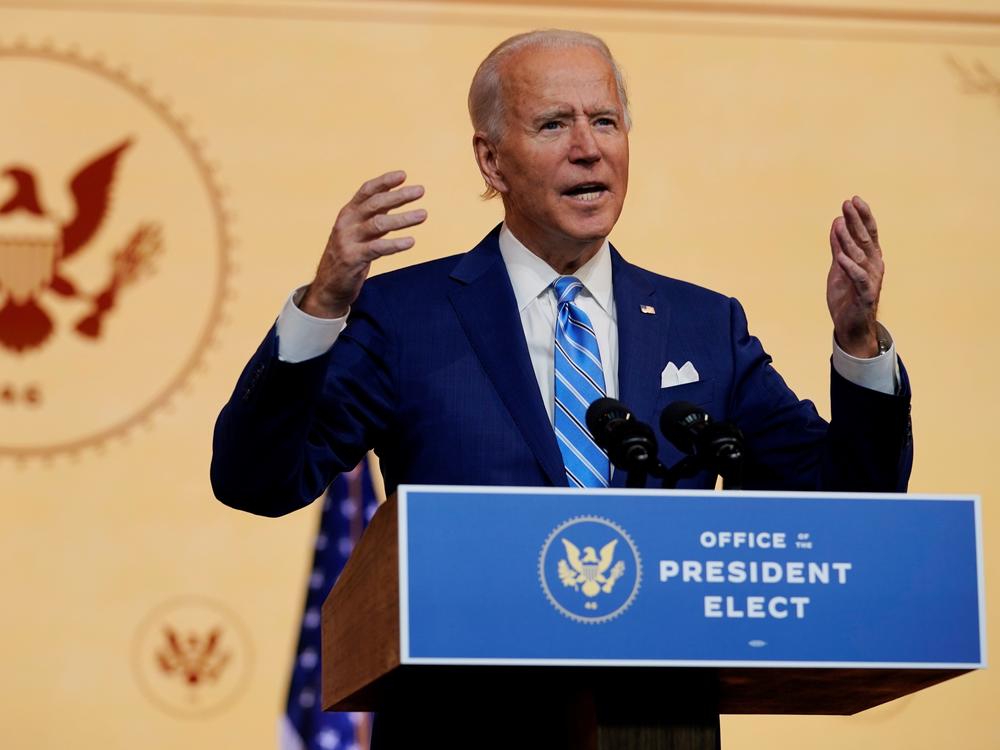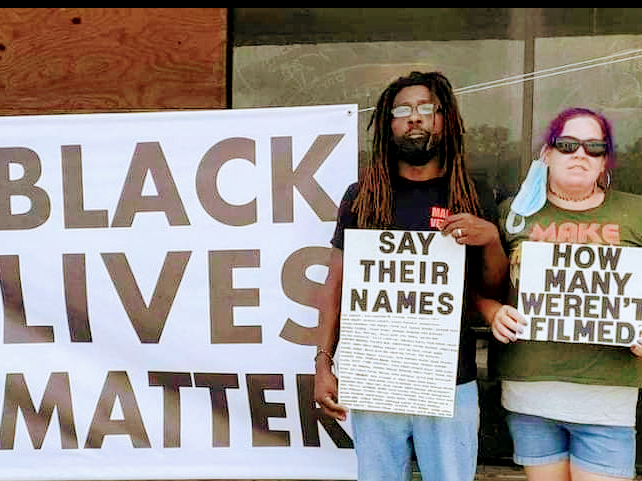Section Branding
Header Content
As President-Elect Joe Biden Doubles Down On Calls For Unity, Supporters Have Doubts
Primary Content
President-elect Joe Biden is doubling down on his calls for unity and healing, reminding Americans, "We are at war with the virus not with each other." In his Thanksgiving address this week, Biden reiterated the appeal he's been making since his first speech as president-elect, when he implored everyone to "put away the harsh rhetoric," "give each other a chance," and end what he calls "this grim era of demonization in America." But the notion is proving a hard sell to many, including Biden's own supporters.
"That's a wonderful sentiment," says Abbi Gold, a 59-year-old office manager and Democrat from Arizona. "[But] it's probably a really sweet pipe dream."
Gold says it's been challenging in this political climate to hold on to some of her relationships with loved ones who support Trump. She thinks it may be generations before the political rancor subsides enough to allow for any real rapprochement.
"We're not going to have any healing until the public at large learns to have a nice cup of 'shut-up' before they say whatever's on their minds," she quipped.
'Trainings for cross-the-aisle conversations'
Hoping to help, many around the nation are ramping up trainings for cross-the-aisle conversations, including a group called Braver Angels, which runs "Red-Blue workshops" that teach skills for civil discourse and encourage participants to find common ground.
"It's a relationship building process. It's a humanizing process" says Braver Angels Partnerships Specialist Julie Boler. "When you have the experience yourself of feeling a little opening, a little less frantic rejection, then you've learned at least it is possible for some of that softening to happen."
Enrollment has spiked this fall, says Boler, but she conceded, it may be a self-selecting crowd that's open to dialogue. There are plenty who not only don't aspire to healing and unity, they see it as capitulation.
New York psychiatrist Darwin Buschman, 64, is among those for whom bridging the gap with die-hard Trump supporters, is just a bridge too far.
"This is not an alternate viewpoint. This is racism, hate, lying, demagoguery, sociopathy, what else can I say," he fumed. "[They are] bad people. I will not sit at a table with them. I will not have a conversation with them."
'Their turn to extend the olive branch'
Nor would Elizabeth Murphy, 36, who works in social services in Georgia. She likens reaching out to Trump supporters to taking back an abusive husband.
"I just don't see us being like 'Alright, we're cool now,' " she says. "This is so far beyond political. This is moral. This is personal. This is my family."
Murphy, who is white and married to a Black man, says in the past four years they've been harassed — even spit at — by Trump supporters they believe were fueled by the president's divisive rhetoric. She wouldn't even consider engaging in any fence-mending with Trump supporters, she says, unless it started with an unqualified admission that they made a mistake, and an apology. Her husband, Tracy Murphy, 44, feels the same way.
"It's their turn to extend the olive branch. They're the ones who messed up everything. It's not my job to fix it," Tracy says. "It's a funny thing that the person who was the victim always has to end up being the bigger person."
"I'm exhausted from going high," Elizabeth says. "I am worn out from four years of trying to go high."
But both are quick to add, they're not holding their breath for an overture from the other side.
Sees Democrats' calls for unity as disingenuous
Indeed, many on the right are just as adamant that they're the ones owed an apology — by what they see as radical, socialist mob threatening core American values of life, liberty and the American dream.
Virginia Republican Katherine Schoonover says she's all for bi-partisan cooperation in principle, but she sees Democrats' calls for unity as disingenuous.
"I don't know how you go from telling everybody that they're all secret Nazi, fascist, bigoted racist people, and you're going to say 'Now, let's come together.' It's just ridiculous coming from the Democrats now," she says.
Schoonover's especially averse to the idea given the ongoing claims that the Democrats stole the election. Even though there's no evidence to back it up, she believes Trump's claims that the Democrats cheated their way to victory.
"It's shocking," she says. "And I think that if the Democrats try to ram this down everybody's throats, you're going to have a real problem."
It's exactly why Darrell Duane, a 51-year-old Biden supporter from Washington, D.C., has been echoing the president-elect's calls for unity, and imploring his friends to not dig in their heels.
'See the humanity in each other and rebuild'
"Unfortunately, that's recipe for civil war," he says. "And that's just what the enemy wants. Trump wins as he creates more and more polarization."
But so far, Duane concedes, his friends have been resistant to his pleas to "see the humanity in each other and rebuild the social fabric of our nation."
"I've gotten in trouble for it," he says. "I've gotten called nasty names for being 'Kumbaya.' "
In his Thanksgiving address Wednesday, Biden, himself, acknowledged that the imperative "to love our neighbors as ourselves," may strike many people right now as "a radical act." But Biden insisted, "We must try."
New York Democrat, Vincent Downing, 58, has also felt the pushback. He's with a group called "When Humanists Attack," which advocates more cross-the-aisle empathy and understanding. As Downing explains it, "You can have an amiable discussion with somebody who you are opposed to politically and philosophically."
But Downing says he totally understands why his friends are "sick and tired" of hearing it from him; he too has a tendency to think "like any good lefty would."
"I'm a lot happier when I just think 'I'm right, right, right, right, right all the time [...] and ugh, those god-awful people who disagree with me, they're just so wrong about everything all the time,' " he jabbered, mocking his own indignation and hubris. "We've got an addiction to [believing] we're right about everything all the time running rampant in this country."
But inevitably, Downing says, "Sanity kicks in, and I realize. ... if you want to help other people escape from their echo chamber, the first step is you've got to escape from yours."
There's a big difference, however, between coming together to communicate, and compromising on core principles, Downing says.
"There are people on the right who do not see me as a human being, who think, for example, because I'm queer, I should not have the right to marry," he says. "I cannot compromise with them. They are exceedingly dangerous to me [...] and I am deeply offended and appalled that they have succumbed to what I call tribalism. But that doesn't mean I'm going to turn around and make the same mistake [by dehumanizing them.]"
Heeding the call easier said than done
"Nietzsche said you fight dragons, you don't want to become one," he says.
Both sides, Downing says, would do well to give each other a little more benefit of the doubt. "Aside from the psychopaths ones among us, very few people are trying to do evil."
Still, Downing is the first to concede his magnanimity definitely wavers. All too often, he says, he still struggles with being swept away by a "knee-jerk, emotional reaction."
Take for example the "Trump Accountability Project," a blacklist launched online shortly after the election, to shame and shun Trump supporters. When Downing first heard about it, he loved the idea. "These people have to be held accountable for enabling this madman [...] They need to be punished. We can't pretend they did nothing wrong."
But just a few days later, Downing had thought better of it.
"I thought, I better look at my own vindictiveness," he says. "Yes, society has a need for people to be punished. But as a pragmatist, I know that society also has a need to move on. I hate to say this, and this is not going to score me any points with my friends right now, but maybe the answer is we have to forgive, but not forget."
Turns out the "Trump Accountability Project" had second thoughts as well. While the idea was originally promoted by prominent Democrats, the website shut itself down shortly after it launched. Explaining that it had only intended to ensure that those "responsible for loosening the guardrails of our democracy are not rewarded" and "to play a part in restoring the soul of the nation," the "Trump Accountability Project" announced it was ceasing operation.
"In the spirit of the President-elect's call to build a more united country, this project will no longer be active," read a statement on the website.
Copyright 2020 NPR. To see more, visit https://www.npr.org.


